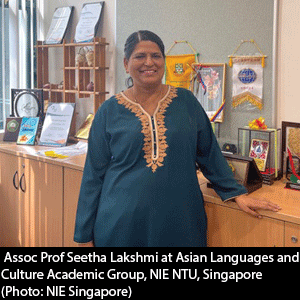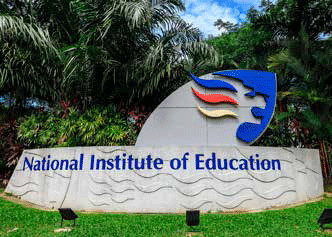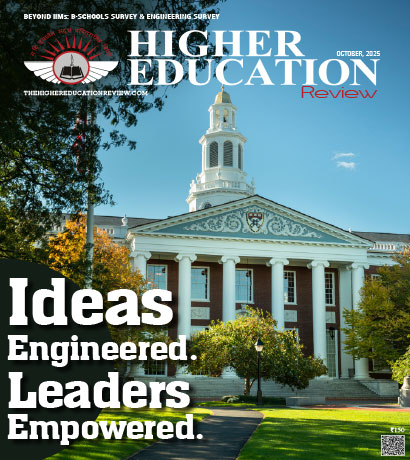Championing Tamil Language Research At Nanyang Technological University’s National Institute Of Education
 Tamil, a classical language of immense beauty and depth, is spoken by millions in India, Sri Lanka, Malaysia, and Singapore, encapsulating a rich cultural heritage that includes poetry, philosophy, and ancient texts. It offers a window into the societal norms, beliefs, and values of generations past. Whether for the pursuit of literature, history, or a broader cultural understanding, Tamil opens a doorway to a world of intellect and heritage.
Tamil, a classical language of immense beauty and depth, is spoken by millions in India, Sri Lanka, Malaysia, and Singapore, encapsulating a rich cultural heritage that includes poetry, philosophy, and ancient texts. It offers a window into the societal norms, beliefs, and values of generations past. Whether for the pursuit of literature, history, or a broader cultural understanding, Tamil opens a doorway to a world of intellect and heritage.
Motivated from her outstanding performances in oratorical, written, and debate competitions, Dr Seetha Lakshmi, an Associate Professor at the National Institute of Education, Nanyang Technological University, Singapore (NIE NTU, Singapore) discovered her profound interest in the Tamil Language when she was growing up.
“From an early age, I always strived for superior performance in everything I participated in,” Dr Lakshmi fondly recalled. “The competitions and performances I participated in expanded to inter-school competitions and performances, pushing me to achieve further.”
Transitioning from a career in freelance journalist, feature producer, and compere in the radio, to teaching, Dr Lakshmi continued receiving recognition for her poetry presentations and creative writing, further fueling her dedication to Tamil language research.
“What resulted in me dedicating myself entirely to the Tamil educational research was a golden opportunity presented to me by the then-Senior Leadership in NIE to embark on Tamil language-based research studies. After that, research became my life,” Dr Laksmi recounted with a laugh.
Research Interests and Contributions
Throughout Dr Lakshmi’s illustrious research career, her interests encompass various crucial areas within Tamil language education:
1. Standard Spoken Tamil for Diaspora Children: Encouraging the use of Standard Spoken Tamil in classrooms to promote Tamil among diaspora children.
2. Curriculum Review for Second and Third Language Students: Creating a tailored curriculum for students learning Tamil as their second or third language.
3. Sociolinguistics of Singapore and Tamil Diaspora: Understanding the sociolinguistics dynamics to make Tamil a living language for future generations by.
4. Applied Linguistics in Tamil Education: Conducting applied linguistics-based studies for effective language teaching and learning.
5. Pedagogy for Second and Third Language Learning: Developing pedagogical approaches to teach Tamil as a second or third language effectively.
Research Journey and Impact
Dr Lakshmi’s research direction was inspired by schoolbased visits to Tamil classes, igniting her interest to elevate Singapore’s official language status for Tamil language, and supporting people outside India overcoming language challenges. Her innovative approaches within the field of Tamil language education, particularly the implementation of Standard Spoken Tamil in classrooms through curriculum and pedagogy reviews, established NIE’s role in making Tamil a real living language used in Tamil homes and Tamil classes.
“The impact of Standard Spoken Tamil is clearly evidenced in our corpus of the Tamil language within the Tamil classroom,” Dr Lakshmi asserted. “Overseas Tamil diaspora communities have embraced the Standard Spoken Tamil developed by us in their curriculum and pedagogy, with Singapore serving as a role model to their use and pedagogical initiatives in speaking and teaching Tamil.”
Overcoming Challenges
Dr Lakshmi acknowledges the challenges inherent in research. One significant challenge she encountered was encouraging deeper awareness among parents to speak Tamil language to their children and integrate the language into their daily lives to enhance their linguistic identity. To tackle this, she advocates for teachers to incorporate engaging and enjoyable elements into Tamil languages classes from an early age.
 Finding satisfaction in the communities’ understanding of her research findings and the application of evidence-based studies in classroom, Dr Lakshmi would embark on another doctoral study in a heartbeat, focusing on the use of Tamil language among Tamil diasporas if she were to start anew.
Finding satisfaction in the communities’ understanding of her research findings and the application of evidence-based studies in classroom, Dr Lakshmi would embark on another doctoral study in a heartbeat, focusing on the use of Tamil language among Tamil diasporas if she were to start anew.
Invitation to Aspiring Researchers
Reflecting on her academic journey, Dr Lakshmi offers insightful advice to prospective graduate students aspiring to venture into a rewarding career in research. She emphasises the significance of immersing oneself in extensive reading of research articles, advocating for continual exploration and reevaluation within one’s research domain. Stressing the importance of in-depth understanding and effective communication, she highlights the privilege of studying in a leading teacher training institution and prestigious university like NIE NTU, Singapore.
If you aspire to expand your knowledge through research in a progressive and advanced environment like NIE, applications for the August 2024 intake are open until 31 January 2024 for research programmes. For more information, visit www.nie.edu.sg/aug2024.
To find out more about Associate Professor Seetha Lakshmi and the research by the Asian Languages and Cultures Academic Group at NIE, please visit https://www.ntu.edu.sg/nie/about-us/academic-groups/asianlanguages- and-cultures.
The National Institute of Education (NIE) is an autonomous institute under the Nanyang Technological University (NTU), Singapore. It has been consistently ranked among the top 30 educational institutions in the world and the top five in Asia by the Quacquarelli Symonds (QS) ranking.

